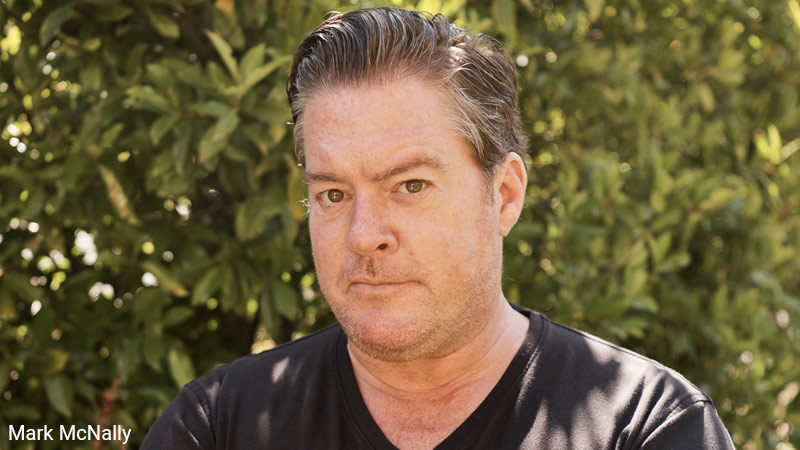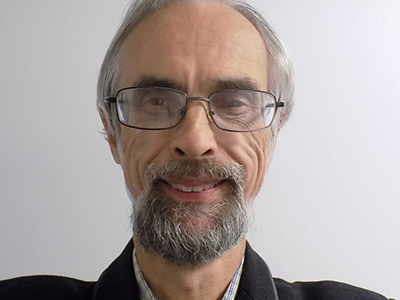Mark McNally Is the Nobody Who Seeks to Shake Up the Startup World With Crowd Infusion
Every entrepreneur jumps off the startup cliff believing they have a working parachute, but more often than not, it doesn't work. The hardiest souls learn some lessons (double-check that chute, do more realistic market research) and do better the next round. The rest feel burned and return to something more secure (if there really is such a thing in the post-pandemic world).

Mark S. McNally has a new vision for the entrepreneurial journey, and it’s come to life as Nobody Studios. He is the Founder and Chief Nobody, explaining that "we're Nobody because we're everybody — what we're doing is not about us, but about the entrepreneurs we support." Located in Laguna Beach in Orange County south of Los Angeles, Nobody Studios looks to a global crowd to help source and develop innovations that could change the world. Anybody who wants to work with Nobody Studios might get credit for the idea, help bring it to life, or even become the CEO of a startup (one startup co-founder was McNally’s Uber driver).
Nobody Studios is a venture studio — a relatively new model in the startup world. Typically, venture capitalists (VCs) fund a new company in exchange for partial ownership, then move on to their next deal as they wait to cash out. Incubators and accelerators provide varying levels of support or capital to startups. Venture studios build new companies in-house. Nobody Studios is incubating many companies at the same time, drawing on an ever-expanding team of leaders and professionals who have experience in the hands-on development of young companies.
The focus is on de-risking seed stage companies prior to investment from VCs. Investors in the Studio receive equity across the entire portfolio of startups, creating instant diversification. And each of those startups goes through a rigorous vetting and incubation process called "frugressivity" (frugal + aggressive + creative).
Another unique aspect of the studio is to provide access for anyone (not just the wealthy or accredited) to become an investor through “regulation” crowdfunding. The expectation is that the Securities and Exchange Commission will approve Nobody Studios as one of the first venture studios to offer equity crowdfunding, though the company does not determine the exact timing.
"I've been through several major changes in business in my career and I think we will see 5 to 10 paradigm shifts in the next couple of decades that will take down most of the big companies today," McNally predicted to Startup Savant. "They will be replaced by babies that will become huge themselves and then fail to adapt to the next disruption. Nobody Studios is building organizations that will be leading that innovative ‘destruction’ of the old and creating massive positive impact."
Nobody Studios’ goal is to launch 100 impactful startups in the next five years, and 14 are already underway. The first, Parentipity, is a community that pays parents for their tips on rearing kids. Its initial product launch was achieved in five months in 14 languages and 20 countries at a cost of just $78,000.
"We specialize in de-risking seed-stage companies and identifying repeatable, scalable business models. We bring together investors, founders, and creatives to forge companies with real-world value and purpose," McNally explained. "The economics of business creation are in desperate need of an overhaul. No longer will it be only a very tiny privileged minority that is invited to this table. Our stakeholders will share the founders' journey. Anyone can bring their talent, influence, or capital to help us create world-changing companies. "
He has quite a bit of credibility when it comes to realizing dreams: he was involved in 14 startups before Nobody, raising a total of $300 million, with a $5 billion valuation for investors at exit.
The Journey to Nobody
McNally's mom was a radiologist (now retired), and his dad was in real estate but was always a tinkerer, thinking up ways to create gadgets and telling Mark stories about inventors who struck it big. At just five years old, Mark announced that he wanted to start his own company.
His parents divorced when he was young, and his step-father was a lab phlebotomist who went into information technology. "He taught me how to break down problems to come up with solutions," McNally recalled.
His grandfather was an Air Force colonel who became a mentor and inspired McNally to join the military. From 1992 to 1997, he served in Army special operations.
"It taught me how to do seemingly impossible things with few resources and a highly-optimized team of members who trusted each other completely, which was the perfect training to become an entrepreneur," he said.
After traveling the world for five years in the military, he headed for Las Vegas, where his sister and her husband were living, thinking about what he wanted to do next. In 1998, he was recruited as the eighth employee of a business-to-business ecommerce startup that would eventually employ 800 and reach the Nasdaq. His work ethic soon prompted the CEO to promote him five levels into the leadership team.
In July 1999, it was set to go public, but the tidal wave of other initial public offerings caused investors to feel jaded, and many on Wall Street decided to take vacations from the madhouse.
"Everyone told us to just postpone our IPO because no one was interested, but we were almost out of money, so our CEO persisted," said McNally. "When investors returned, we were one of the few companies ready to go. Nine months later, we had $50 million in the bank and, at its height, the company had a $4.5 billion valuation."
But after the crash in 2000 and again in 2001, the company took significant blows to valuations along with the rest of the market, eventually selling to a private equity group out of Silicon Valley. McNally made it through, learning an enormous amount, and the technology inspired by that company is still in use today.
"Failures keep you humble because you realize that success is not inevitable, just because you have a great idea," he noted. "The road to success is going to have a lot of ups and downs and often depends on an X factor, like one meeting or the next phone call. I've found that really brilliant people often have limited beliefs about what they can achieve. They think mega-success is just something for Gates, Bezos, or Musk, and they shouldn't expect it. But worse are those who are arrogant and think that something they did just gave them the success they deserved."
After the 2001 meltdown, McNally spent a decade building and running entertainment ecommerce platforms, including clients like ABC, CBS, and Discovery. His biggest hit: the FIFA football (soccer) World Cup, which drew 8.5 billion page views from 40 countries in five weeks.
But not everything was successful: he still feels the pain of asking friends to invest in one company that then became a victim of the 2008 Great Recession.
McNally says that one of the highlights of his career was joining the board of one of the biggest international nonprofits in the world. It had begun to struggle, and he was outspoken about what he thought should be done. The board asked him to oversee a reboot in 2010, serving as chief innovation officer for what is now known as Good360.org, which has distributed more than $10 billion in products to other nonprofits doing critical work on the ground around the world.
After 14 months, McNally left to focus on startups in machine learning and artificial intelligence. Along the way, he also helped his wife build her own company over the span of 11 years, which she exited at the start of the pandemic.
Riding the Next Tidal Waves of Change
"It was time for me to take a deep breath and figure out what I should be doing next, so I wrote down all the businesses I've been involved in and what I’ve learned," McNally said. “Perhaps the most important is to be stubborn about sticking with your vision and goals and have a ‘deep why’ about what you’re doing,” he added.
"But all this reflection brought me to the conclusion that virtually all of us in the VC world have been doing things wrong because we've been too focused on the short-term benefit to investors and not trying to solve serious problems. Too many don't care if they put money into five startups and four go under, but one unicorn gives them an enormous return. For the past five years, we've created this culture where we think it's fine to give $10 million to a couple of folks and a dog operating out of a garage with a PowerPoint, giving them a $40 million valuation. This notion that all investors should be concerned with is a profitable exit is really tragic for the long-term health of the economy because the music is going to stop, as it always does. Eventually, entrepreneurs will have to learn that it's best to do something that matters, and to bootstrap if you can and always run a lean machine."
McNally notes that Nobody Studios is not passive capital. It builds companies in-house, providing all the funding, talent, resources, analysis, marketing, and leadership needed to start, build, and launch seed-stage companies and de-risk them for Series A investment.
In addition to Parentipity, mentioned earlier, some of the other early Nobody startups include:
- Ovationz, the Virtual Event Marketplace, a platform to instantly level-up virtual events with an array of on-demand talent and engagement features, addressing the needs of event producers, presenters, and attendees.
- SweatOptions, a “work-for-stock-options” platform that gives visibility, value estimates, reporting, loan options, and even currency-equity exchange.
- PrehabLife, which recognizes that the drug rehab industry has a high rate of failure and offers early intervention to disrupt addiction before the individual hits rock bottom.
- OurHomeowners, an advocate for the 66 million Americans who live in a community with a homeowners' association and are often frustrated by the challenges of dealing with it.
- Espionage.biz, which provides legal corporate research and analysis so that small companies can compete with big ones that have entire departments to track comparative intelligence.
- FreakishData, a data marketplace that enables creators to synthesize new categories and tools to monetize their data while giving customers easy access to a universe of information resources for a fraction of the standard cost.
Ovationz is the most recent Nobody company to launch, headed by Ray Leonard Jr., a world-renowned public speaker and son of boxing champion Sugar Ray Leonard. Many more companies are moving through Nobody Studios’ incubation process and will be launching in the coming weeks and months. McNally says they welcome anyone interested in being part of the company — as an investor, team member, or supporter — to get in touch at NobodyStudios.com/join.
About the Author

Scott S. Smith has had over 2,000 articles and interviews published in nearly 200 media, including Los Angeles Magazine, American Airlines’ American Way, and Investor’s Business Daily. His interview subjects have included Bill Gates, Richard Branson, Meg Whitman, Reed Hastings, Howard Schultz, Larry Ellison, Kathy Ireland, and Quincy Jones.
Startup Resources
- Learn more about Startups
- Visit the TRUiC Business Name Generator
- Check out the TRUiC Logo Maker
- Read our Business Formation Services Review
- Find Startup Ideas
- Explore Business Resources
Form Your Startup
Ready to formally establish your startup? Click below to read our review of the best business formation services!
Best Business Formation Services